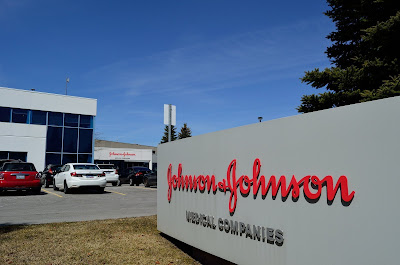Johnson & Johnson Told to Pay $8 Billion in Damages
In August 2017, we looked at a
case whereby Johnson & Johnson, the global pharmaceutical company, were ordered
to pay more than $400 million in damages. However, this month a Jury in
Philadelphia decided that the company would face a much higher financial
penalty on account of its development and marketing of an anti-psychotic drug
that has been linked to the development of breast tissue in men. In this post we
will look at this award, what it means for J&J, and what happens next.
The case has been brought by
Nicholas Murray of Maryland, who has claimed that he developed
female breast tissue after taking the drug Risperdal
when he was younger. It has been reported that the drug has been linked to
the abnormal growth of breast tissue in boys. Risperdal is used to treat a
number of mental/mood disorders, including
schizophrenia, bipolar disorder, and some variants of autistic disorder. The
US Food and Drug Administration approved
the drug for use in 1993 for these conditions. When assessing online
medical websites, the associated side-effects seem to be common for this type
of drug (dizziness, difficulty swallowing, mood changes etc.), but now this new
link has fundamentally changed the conversation surrounding this drug.
In just one of thousands of cases
pending on this subject, Murray had claimed that J&J failed to warn of the
risk of ‘gynecomastia’, and that the company had marketed the drug for the
usage of children, in appropriately. In 2015 a jury awarded Murray $1.75
million for not warning against the risk of gynecomastia, but this was reduced
to $680,000 on appeal. Murray’s lawyers stated that the ‘conduct that the jury
saw in the courtroom, was clear and convincing that J&J disregarded the
safety of the most vulnerable of children’ and that J&J is a company ‘that
has lost its way’. Whilst J&J have responded by saying that the award
is ‘grossly disproportionate with this initial compensatory award in this case’
and that it will be appealing, the horizon looks troubling for the corporate
giant.
This month the company reported
third-quarter earnings and revenue figures that beat
expectations (revenue was around $20 billion), the potential for losses
relating to legal issues is mounting every day. This current case is
potentially going to open the floodgates, especially as a court recently
allowed for a mass
tortious litigation to take place. Yet, cases relating to sale of this
particular drug are not the company’s only problem. They are also currently
embroiled in cases surrounding the cancerous effects of baby powder, their
development and distribution of opioid-based products, and also artificial hips
– in May the company agreed to settle for more than $1 billion for the
manufacture and sale
of defective metal-on-metal hip replacements. Add to this the liability the
company is facing regarding the development of defective vaginal mesh products,
it becomes clear the company is facing serious legal difficulties in spite of
its good financial performance. It has been suggested in the media that
settling these cases will cost
the company near $20 billion, but that is certainly not set in stone.
Depending upon the example that the judiciary may want to set, it could be much
higher indeed.
The question then becomes what
this all means for J&J moving forward. Its shares are down in response to
the potential for liability costs, but they will probably rebound. However, it
is the company’s business practice that is being called into question, with it
being commented that the company used to be known for its gold-standard ethical
approach and, now, that is evaporating. Yet, it may just be the case that the
environment around J&J is changing rapidly, and they are being caught out.
30/40/50 years ago, the ingredients and effects of their baby powder were not
high on the agenda, but in the current climate that focuses on health,
wellbeing, and sustainability, they are. The effect of the opioid crisis and
the new demographic of its victims has shone a light on the selling practices
of these massive firms, and J&J has been found to have come up short.
Perhaps the important question is what J&J will do now moving forward. If
the financial penalty is large enough, the move to reacquaint themselves with
those gold-standard ethical principles will be more attractive. However, if
they can ride this wave, or ‘bronco’,
and come out of it intact, then there is less of an incentive to change. The
collective financial penalty has to be so large so as to inspire change because
that is the only form of punishment that is allowed within the current system –
J&J executives will not be personally punished for the drop in standards,
only financially punished by proxy. The future for J&J, and for their customers,
hinges on how they react to this current crisis facing them as a company.
Keywords – Johnson & Johnson,
Pharmaceuticals, business, law, @finregmatters





Comments
Post a Comment